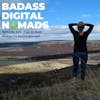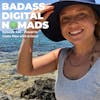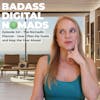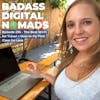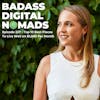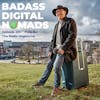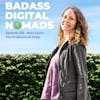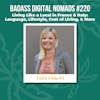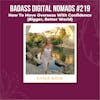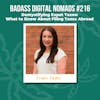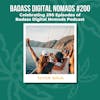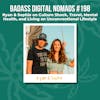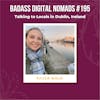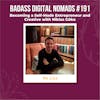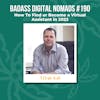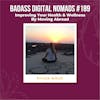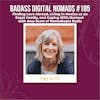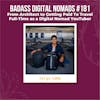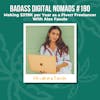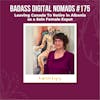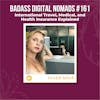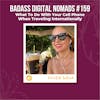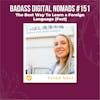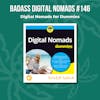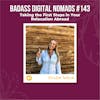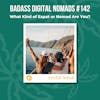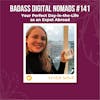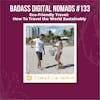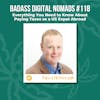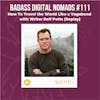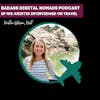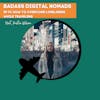Living in Costa Rica Since 1999 with the Founder of CRSurf.com

Thinking of moving to Costa Rica to live the pura vida lifestyle? Today’s guest, Greg Gordon, is an expert in expat living. He’s been living in Costa Rica since the 1990s as the founder of the country’s first online surf report, CRSurf.com.
"When you move to a foreign country, you do feel lonely sometimes. Trading texts, emails, and Facebook messages sometimes isn't enough." - Greg Gordon
Thinking of moving to Costa Rica to live the pura vida lifestyle? Today’s guest, Greg Gordon, is an expert in expat living. He’s been living in Costa Rica since the 1990s as the founder of the country’s first online surf report, CRSurf.com.
In Episode 135 of Badass Digital Nomads, Greg and Kristin discuss how Costa Rica has changed over the years. They both witnessed the tourism and real estate boom firsthand. Greg shares how he taught himself to blog and code during the early internet days. He then offers tips on how to grow an online business with no experience, achieve work-life balance, and run his company from anywhere.
Kristin and Greg also share their favorite places to visit in Costa Rica and explain how to stay safe and avoid common scams. Even though Costa Rica has a higher-than-average crime rate and cost of living, it’s still a magical place to live or travel (if you know what you're doing).
Tune in now to learn some of Costa Rica’s best-kept secrets and tips from two of its most experienced expats!
"If you want to make a million dollars in Costa Rica, bring two million dollars." - Unknown
EPISODE 135 TOPICS DISCUSSED:
- How Greg ended up living abroad in Costa Rica and how he taught himself Spanish.
- The reality of living in Costa Rica (pros and cons).
- Overcoming loneliness while living abroad.
- Crime, cost of living, and infrastructure in Costa Rica.
- Tips to stay safe and avoid getting your stuff stolen.
- Greg's various income streams as an expat over the years.
- Burning out in corporate America then moving to Costa Rica.
- Meeting your significant other abroad.
- Finding work-life balance as an expat or retiree versus making a lot of money.
- Living a vacation lifestyle with a low budget.
- Splitting your time 50/50 between the USA and foreign countries.
- Driving from California through Mexico to Costa Rica.
- Buying or shipping your car to Costa Rica.
- Crossing borders and dealing with police in Central America.
- Greg and Kristin’s favorite Costa Rican foods and restaurants.
QUESTIONS ANSWERED:
- How has Costa Rica changed since the 1990s? Was there less crime before the tourism boom?
- Is it dangerous to drive from San Diego through Mexico and Central America?
- How did you learn SEO by yourself?
- How did you teach yourself how to build a website with no experience?
- How do you avoid theft in Costa Rica?
- Do you own a house or rent your house in Dominical?
- What is your favorite surf spot in Costa Rica besides Dominical?
- What underrated destinations do you recommend in Costa Rica?
- Costa Rica Lightning Round
RESOURCES
Join the waiting list for Kristin's relocation coaching program, Ready To Relocate.
Videos:
Articles:
Podcasts:
- Shark Attacks, Surf Photography, and World Travel with Surfing Magazine’s Jimmy Wilson
- The Dark Side of Costa Rica - Why Expats Leave
- How to Move From England to Costa Rica + UK and Europe Lockdowns
- Eco-Friendly Travel: How to Travel Sustainably
Surfing:
Places to Visit and Surf in Costa Rica:
- Dominical
- Nosara
- Pavones
- Osa Peninsula
- Pan Dulce
- Isla Uvita
- Nauyaca Waterfalls
- San Isidro del General
Best Restaurants in Costa Rica:
- Bar Jolly Roger
- Taj Mahal Escazu
- Lubnan San Jose
- Jaco Walk
- Caliche’s Wishbone
- Fuego Brewery
- Trits Ice Cream Sandwiches by Dos Pinos
Connect with Greg Gordon & CR Surf:
...........................................................................................
Connect with Kristin:
- Follow on Instagram
- Subscribe to Traveling with Kristin on YouTube
- Subscribe to Digital Nomad TV on YouTube
- Follow on Medium
- Follow on Clubhouse @KristinWilson
- Join the Badass Digital Nomads Facebook Group
...........................................................................................
Support the Badass Digital Nomads Podcast:
- Buy Me a Coffee
- Become a Patron
- Leave a 5* Review: https://lovethepodcast.com/digitalnomad
- Buy Official Merch
- Search All Episodes: www.badassdigitalnomads.com
...........................................................................................
Thank you to Margit for the coffee! ☕️
A special thank you to Kristin's 2021 Patrons: Teklordz, Walt, Shawn, Richard Y, Heather, Karen, Kiran, Scott, Michael J, Issac, Mike M, Yasmine, Erick M, Yohji, Gary R , Ron, Gary, Ray, Henry L, Kelly, Alejandra, Keith, Stephen, Warren, James, Daniel, Gary B, Emily, Rich, Aisha, Phil, Anthony, Jennifer, Kathleen, Natalie, Dave B, Brian, Christopher, CJ, David G, Mike R, Chip, Shelly, Ron, Paul, Andy, Jeffrey, Paulo, Stephen, and Michelle.
Special welcome to our newest Patrons from October 2021: Jeffrey, Paulo, Stephen, and Michelle!
Become a Patron for $5/month at Patreon.com/travelingwithkristin
...........................................................................................
Podcast descriptions may contain affiliate links of products and services we use and recommend at no additional cost to you.
Sneak Peek:
Greg: 00:00:00 The phrase is, if you want to make a million dollars in Costa Rica, bring $2 million <laugh>, because there are just a lot of unseen expenses down there. You could buy a half a million dollar house and then end up spending $200,000 a year just on maintenance and insurance and taxes. And there's a lot of security issues that are involved that you wouldn't think about in the US because even though it's a very safe country and there is a criminal element down there,
Introduction: Welcome to Badass Digital Nomads, where we're pushing the boundaries of remote work and travel, all while staying grounded with a little bit of old school philosophy, self-development, and business advice from our guests.
Kristin Wilson, Host: 00:00:50 Hi everyone. Kristin from Traveling with Kristin here. And welcome to episode 135 of Badass Digital Nomads with Greg Gordon, the founder of the first ever Surf report website in Costa Rica, CRSurf.com. Greg has been traveling or living abroad in Costa Rica since the 1990s. And to be quite honest, at this point, I think he's pretty much perfected the art of the expat. His home base is in Costa Rica, but he also enjoys traveling abroad and visiting friends and family on occasion in the us. So Greg is basically living the life, the Pura Vida lifestyle, and also the location independent lifestyle. Greg's story is really interesting because he has been around since the very beginning to witness Costa Rica's tourism and real estate boom firsthand. So we're going into detail today on how things have changed over the years, for better or worse in the land of Pura Vida, but more importantly how you can still have an authentic travel or living abroad experience in Costa Rica, even in the 2000 twenties and beyond.
Kristin: 00:02:11 Greg also explains how he was able to teach himself how to blog, code and do SEO back in the wild west of the internet with no programming experience whatsoever and how he's been able to sustain and grow his business over the years and continues to run his business remotely today. He also shares with us his secrets of the best places to visit in Costa Rica off the beaten path, as well as his extremely valuable and creative tips for avoiding theft and staying safe. Two issues that I talked about in detail in my viral video on Why I left Costa Rica, which as I record this is the most watched video on my channel with close to 1.5 million views. So I thought I knew a lot about Costa Rica, but Greg shared some things today that I hadn't even thought of. So I hope you enjoy this insider look of living in Costa Rica from two gringos who have spent a combined 30 or 40 plus years living there.
Kristin: 00:03:24 And if you'd like some help from me in planning your future relocation to Costa Rica and beyond, then you can join the waiting list for my group coaching program Ready to Relocate. That is reopening for enrollment in January of 2022. You can apply for a free one hour relocation strategy call with me at travelingwithkristin.com/apply. And there's also a link in the show notes. Okay. Dis thing. Enjoy.
Kristin: That's where I wanted to start. Okay. I've been using your surf report. The first time I went to Costa Rica was in 2002 and I used your surf report and I actually, fun fact was the first person to do the surf report for Surfline Nosara when I lived in Playa Guiones in 2005. So on my way to work at the real estate office, every day I would drive my four wheeler by, check the beach, check the waves, take photos on my super old crappy digital camera, right?
Kristin: 00:04:29 Upload them or email them to the Surfline guys. I really don't remember. I did that for probably a year. And then I got, or no, maybe not a year, a few months, and I got really busy and then I had my project manager from the real estate office out there taking photos. Thanks Marco. And then finally I relinquished it and eventually the guys at, I think one of like Surfing Nosara or something eventually came around and they started doing it. But yeah, it's from my past life as a competitive surfer. It's like at your, the name of your website. I've known it ever since I knew what Costa Rica was and ever since I went there. So give us some insight into who you were, what you did before you ended up starting, what I'm assuming was probably the first surf report website in Costa Rica.
Greg: 00:05:22 Well, I went to college in Virginia and there it was a liberal studies school. So it really changed my focus from like more finance and making money to exploring the world and trying to help people. And with that degree, I was able to get a teaching job in Cocoa Beach, Florida. Okay. And so I moved to Cocoa Beach in '94 and I enjoyed teaching and I really got into surfing then. And every summer I could do a surf trip. So I went to Jamaica a couple times. And then in '96 I made my first surf trip to Costa Rica and definitely fell in love with it back then. Uh, the Arenal volcano was still spurt and lava. It was right after Hurricane Cesar on the Caribbean side. So I got to surf like East Louie Vita pretty much empty and then hit Manuel Antonio and, um, Dominical for the first time.
Greg: 00:06:17 So when I got back to Florida, I was trying to figure out a way that I could move down there. In Florida, almost every surfer wants to or has the dream that they want to move to Costa Rica and buy some land and just stay down there and surf. So that was my goal. And so in '98, I took a year's leave of absence from teaching and went down to Costa Rica, took Spanish classes for a month. And because I wanted to know what was going on in the other parts of the country, I would call up different surf shops or hotels and asked them how, how the waves were, what they thought the waves were gonna be that weekend, and if anything was going on in the community like concerts or beach cleanups or just community events. And I, I put 'em all together in a Word doc and print it out on this Canon portable printer I had.
Greg: 00:07:14 And then I would post it around Dominical back when, um, San Clemente restaurant was open, they had like a little bulletin board where you'd put up different flyers and stuff. So I would put up the surf report there and then email it out to a couple of friends. And after a year, I was also doing some surf photography back then using a four digital cameras. And I would have to take this bus an hour and a half over the mountain to get to where the one place I could develop photos was. And sometimes the roads would be washed out or there'd be giant potholes. And of course it was hot and humid inside the bus. So I realized I, I wouldn't be able to sustain this lifestyle for too long. So I went back to Florida in '99 and decided I would need to teach a couple more years and save up money and buy a truck.
Greg: 00:08:09 And so I did that. And then in 2001 during the summer, I had the truck. I took all the things that I thought I would need, and a friend actually gave me a dog <laugh>, just, uh, that there was a dog that was up for adoption. It was a beautiful black lab. And I drove from Florida to Virginia, picked up my friend, we drove cross country with the dog and surfboards on the roof. And then I bought new tires in San Diego. And then I drove from San Diego down to Costa Rica in the summer of 2001. Figuring that I would be able to make a living, um, taking surf photos and doing a surf report. And I would have advertising on the website. So this is well before Google. I think AOL was still popular back then, American online. And so, uh, I got down there, I was working in Tamarindo for a few months and um, the person that ran the Spanish school in Dominical just randomly saw me in this internet cafe and asked if I wanted to run the Spanish school in Dominical.
Greg: 00:09:22 And I would get paid like 800 a month free room and board. And the school was like a block from the beach. So I was like, sure, yeah, I'll do that. <laugh>. So I drove with the dog and the surfboards and all my stuff down in Dominical and I was based there until, um, the end of 2002. So in that time I was able to grow the website. I had like 20, 25 advertisers and then friends that were wanting to come down in Surf Costa Rica, they were like, Hey, you know, how do I rent a car and what hotel should I stay at? So at that point I kind of changed my focus more from writing articles and doing surf reports for the website to selling travel online.
Kristin: 00:10:07 I love that. 'cause you were just basically filling a need. You were answering people's questions, you were solving people's problems, and you created this lifestyle business out of it. Let me ask you this, did you have any web development experience? 'cause you were a liberal arts major and business and finance, or did you just teach yourself how to do that?
Greg: 00:10:27 There was a lot of teaching myself. My first job at Cocoa Beach Junior, senior high school was technology and business. So I was using like programs like office and um, so I was comfortable on the computer. And then my first job in Costa Rica after working at the Spanish school was for this hotel the Villas Rio Mar, back in 1998. They first wanted me to make a payroll system for 'em using Excel, and their computer system was all in Spanish. So I had to, that's how I learned Spanish very well, was translating the software instructions from English to Spanish just based on what I'd see on the screen. Then after I finished that, they had a unusual request for, back then they wanted to improve their search engine ranking. And this is 1999. Like I'd never even heard that before.
Kristin: 00:11:22 God, you're like thanking your lucky stars that they asked you to do that <laugh>.
Greg: 00:11:26 Yeah. So they were like, how do we do that? We want you to do that. So I learned about keywords, I learned about link exchanges, and so I'd contact all these other hotels and travel agencies around the country and asked to exchange links. So in, in that year, I picked up a lot of web experience and then I just started, um, using HTML to make the first website. And then I had help from a friend to improve it who was a web designer back up in Cocoa Beach. And so every few years I would, um, do a new iteration of the site and like at least keep up with what the rest of the world was doing.
Kristin: 00:12:07 You are basically collaborating on a remote team back in 2002.
Greg: 00:12:12 Yes. Yes. I love it. Definitely.
Kristin: 00:12:14 And I also wanna highlight how, you know, the best things that happen in life are really unplanned like you had this plan to go down to Costa Rica, but you never thought that you would be running a Spanish school in Dominical. But that ended up being the means to the end with which you had the time, the room and board and the extra money to support yourself, that you could develop your website before there were hashtag side hustles. And this is the magic and the beauty to me, uh, one of the many things about living abroad, and it reminds me of when I first moved to Costa Rica. Well, when I moved back to work there in 2005, after I had studied abroad and gone back and forth a couple times, just like you went there, fell in love, just went back and forth from Florida and between school and saving up money and lifeguarding and things like that.
Kristin: 00:13:08 And the first person I met, uh, my first friend there, she's still one of my best friends to this day. Her name is Joy Birch. And she burnt out at her corporate job in New York working for this massive international, uh, beauty company that shall remain nameless. She takes a sabbatical, goes to Costa Rica, ends up in Tamarindo where she meets her future husband who was working at the Spanish school <laugh>, where she was, she just wanted to learn Spanish and like learn how to surf. And she ends up meeting her future husband. And I met them because she ended up moving down to Costa Rica to be with him. They worked with me at the Coldwell Banker real estate office in Nosara in 2005. And she ended up going to work for the Noss Yoga Institute, which was eventually bought out by another company recently.
Kristin: 00:14:06 And they're still together. They're living in South Carolina. They have two kids, they're like back and forth between Costa Rica and South Carolina. And it's just like she's from South Carolina. I mean, her parents would've never thought that she was gonna end up living in Costa Rica and she got an MBA from Thunderbird, went to work this super high stress corporate nine to five job in New York City. You know the story. And then when she's just on vacation or you know, just on a burnout sabbatical, her whole life changes and goes in this completely other direction. And I think that's one of the, the most interesting things about taking these chances. Like the way that I'm even here today is because my dad went to a Rotary Foundation luncheon in Florida when I was in college, just got invited by a friend and they announced this scholarship program and he took the application packet at home.
Kristin: 00:15:04 Um, my mom mailed it to me at UCF, I filled it out, went through this one and a half year process to apply for this scholarship to study abroad. Got it. And they ended up sending me to Costa Rica. And now, all of these years later, I have this video with like 1.5 million views on why expats leave Costa Rica. And it's like so crazy how everything happened. So I just would, you know, recommend to everybody to take those kinds of chances because you don't know, what's gonna happen. And usually life is more creative than we are, so.
Greg: 00:15:37 Right, right. And, and I like what you said about, you know, doing something that you enjoy doing rather than doing something that you're gonna burn out doing. It's one mantra I've always tried to remind myself of is to have a work life balance where it's not just working to get more money that you can get a nicer place to live or a nicer car. It's more about working so you can have a quality of life that's worth just enjoying a priceless sunset or Yeah. Quality time with friends and, and family. Just free time to be able to surf when the tides and winds are best during a day. People pay thousands of dollars for, for just a week. Of a year to go on a, a surf trip. And luckily for me, I can enjoy a lifestyle where I can surf every day in the place that they're trying to get to just for a week.
Kristin: 00:16:35 I used to think about that all the time 'cause you'd see people with their surfboards on the rental car and going down to Costa Rica and then they have to leave five days later. And that to us was our lifestyle. And granted, sometimes I probably worked too much and skipped those sunset surf sessions that I could see from my office, but that's a little workaholic problem I have. But, um, what is your perspective on the kind of money that people invest in Costa Rica to move their quote unquote permanently to basically buy this lifestyle versus having it earlier on, like living that lifestyle with a low budget versus waiting until you get vested in your retirement and then going down and dropping six or seven figures in real estate?
Greg: 00:17:29 Hmm. Well, I've, I've seen both sides of that. I would definitely be more the former than the latter. So the people that save up and wanna retire down there, I think that they have an image of what it could be like and then get a reality check when they get there. the issue is that <laugh>, the phrase is, if you want to make a million dollars in Costa Rica, bring $2 million <laugh>, because there are just a lot of unseen expenses down there. You could buy a half a million dollar house and then end up spending $200,000 a year just on maintenance and insurance and taxes and, you know, home
Kristin: 00:18:15 And gardeners.
Greg: 00:18:16 Yes. Gardeners. And there's a lot of security issues that are involved that you wouldn't think about in the US because even though it's a very safe country and it's very safe place to live, there is an element, a criminal element down there. So there is, um, robberies, home invasions. There's just not a strong enough police force to, to go after those criminals. And then the other thing is just the, the weather itself. You know, the photos that you see on Instagram and Facebook are glowing sunsets and rainbows and lots of sunshine. But in, in reality, it does rain a lot down there. And with the rain, it's gonna come more insects, it's gonna come flooding and landslides and inconveniences that might make your million dollar dream not really worth it. So those are some things that I would, I advise people that are considering moving there, um, to take into consideration.
Greg: 00:19:17 And, uh, just one other thing is, um, it is only a three hour flight from Miami to get to Costa Rica, but if you have family in other parts of the US or other parts of the world, uh, you are, or at least I felt a disconnect from them. So it made me, when I would go back and visit them, it, it made those times together a lot more important. So sometimes when you're in a foreign country, you do feel lonely and a zoom call or emails or trading text messages or Facebook messages just isn't an, isn't enough. So, you know, be sure that when you, when if somebody is gonna take the plunge and move there, that they also consider that they do want to go back and visit.
Kristin: 00:20:10 Yeah. When I was researching for the video that I made on why expats leave Costa Rica, those were the biggest things that came up because I didn't wanna just use what my opinion was and what my perspective was. So I went in posting in expat Facebook groups and the biggest things were the crime, the cost of living and being separated from family and friends. But having gone to Costa Rica since the 1990s, how is it different now compared to then, if at all? I mean, were the 1990s, the golden years of travel and surf tourism to Costa Rica or is that just nostalgia? Were there always these problems and now it's just that more people know about them?
Greg: 00:20:55 Hmm. There were some good times in Costa Rica back in the late nineties when it comes to surfing. Uncrowded breaks, places like Tamarindo, you could find a peak by yourself. Jaco and Playa Hermosa, they, they always had a little bit of crowds because it was the closest beach from the San Jose airport, but definitely less so than it is now. However, where I live is on the southern Pacific coast near Dominical. And it wasn't until like the early two, well maybe like 2005, 2006, that the highway was even paved. So to get from San Jose down to Dominical, or at least even from Quepos to Dominical, it would take two hours to go down this unpaved, bumpy road. Lots of potholes sometimes closed because the bridges were just like railroad ties. And so that was, it made any kind of surf adventure a lot more difficult.
Greg: 00:21:59 Just the amount of time it took to get anywhere. So I would say today with the condition of the roads that they're paved, that there are lines on 'em. So it's safer to drive, it makes a surf trip or any vacation a lot more. It makes parts of the country a lot more accessible. So I would say in that, in that sense, it's better today. You know, there is more people that go there. But luckily because it took them so long to finish that highway from Quepos to Dominical, there are a lot fewer tourists down near where I live and along the Osa Peninsula than other parts of the country. So it's still a beautiful place to go. And there's, I still say in some parts they're more monkeys than people.
Kristin: 00:22:45 Yeah. Definitely. The southwestern zone of Costa Rica is a lot less crowded than the, the central zone and the Northwestern Zone. And I think, you know, besides the part between let's say Santa Teresa, Malpais Manzanillo area right up to Samara, that area is also pretty local. There's not that much tourism, at least last time I went there. But what a lot of people who haven't been to Costa Rica, or even if you have been recently, what people don't realize is that most of those roads weren't there. Like the highway that's there now, that's recent. Right. That was built what, in 2011? 2012. And it took them like 60 years to build it. And a lot of the bridges that are there weren't there. I mean, just between Nosara or between Playa Guiones and San Juan or Tamarindo, there were, who knows how many rivers you had to cross without bridges.
Kristin: 00:23:45 And even the road to Nosara was just paved this year. So when you're talking about the rainy season, it's, it, it gets pretty annoying because you're, you know, everything's wet all the time, nothing ever dries. It's moldy and mildewy. But then when it's the dry season, you wish it rains because it's just full of dust everywhere and you have dust in like every orifice of your head. In your computer and like, you know, it's like one extreme or the other. But yeah, Nosara you could only get there by plane for a really long time. Yeah. For like decades. I mean, until, I think it was probably the seventies, eighties, I don't know when they actually finally made the bridge. But the Nosara American project, which is the expat community there , when those people settled there, you could only get there by small plane to the airport and yeah.
Kristin: 00:24:38 It was surrounded by river, so. That is one of the things that held back the development, but probably in a good way, because what we've seen in so many places in Mexico and Costa Rica especially, is that development happens very quickly. Like when you have a highway from Cancun down to Tulum and Playa del Carmen, I mean, it's really easy for things to blow up. Yeah. And that's one of the things Costa Rica had going for it to make it more sustainable, is that it was just really hard to get places. And even to this day, there's still places that you pretty much wanna fly, like down to the Osa Peninsula. And then there's areas you can only go by boat. So, um, what about the crime? Because Costa Rica has this perception that's like the nicest people in the world and the friendliest people but sometimes, you know, it also has this reputation for lots of crime and scam artists that comes with a lot of overt tourism as well. But when I lived in Nicaragua, they used to say, this is like Costa Rica 20 years ago, and there was a lot less crime there. Definitely a lot less petty crime, a lot less violent crime. Was there significantly less crime in the nineties compared to the two thousands?
Greg: 00:25:53 I would say that there hasn't been a, the change has been with the increase of tourists. It's just like a, a proportional increase. I wouldn't say that there's a, a higher percentage than before, but besides the, that there are more tourists now that are going down there. It's also the increase in the amount of digital information that's passed along. Oh yeah. 20 years ago there weren't any cell phone towers anywhere in the country. Even 10 years ago there were only a few. And now you, every couple of miles there's a cell phone tower. So every piece of news that can be broadcast on Facebook or, or just through newsletters, um, is going to announce if something happened to somebody. So I think because of that, the crime just has been in a lot more focus now. Uh, it's the same kind of things.
Greg: 00:26:48 People leave their stuff locked in their car and they come back and the car's been broken into, or they stay in a rental home and they leave their laptops out and somebody comes into the rental home and takes their computer and their cameras. That has been going on for, for 20 plus years. Yeah. And on my website, I actually have written a few articles about how to keep your stuff safe, uh, what to do if you're going to the beach, what to do if you're, if you have to go someplace at night. And I write those kind of articles because people that come to Costa Rica feel that they're entering this dreamland of, of where it's just peace and harmony. And I need to remind them that to have a good time, you have to also stay vigilant.
Kristin: 00:27:34 Yeah. You can't have that false sense of security. And I would be interested to know some of your tips. I'll share some of mine with you guys. And these are things that they just kind of came organically through my time living there. But it was my family members who pointed it out to me later that I had this kind of paranoia <laugh>, wherever I went. Like I would never leave anything in the car. Like I would take my backpack, my purse, all my stuff with me into the gas station bathroom. Oh yeah. Like, it wouldn't even have my car at the gas pump with anything of value in it. 'cause I knew I would come out and the window would be broken. And, um, that worked for me. You know, anytime any of my friends would leave something on the seat of the car and run into a convenience store to get something, their stuff would be gone when they got back out.
Kristin: 00:28:25 the, the only time that, I mean, I had my car broken into a few times. One time they stole my iPod back when there were iPods and I had it hidden under the dashboard. I had like tucked it up and they still found it. Oh no. Another time I used to actually, this is like hopefully no thieves are listening to my podcast <laugh>. I don't wanna give them any ideas. But I had to actually take the seats out of the back of my car. So you know how seats can fold up and down and move around, well, in my car it was a four-wheel drive. Uh, ter you could actually, there was like a hidden tab where you could pull the seat, like actually dismantle it from the car. Okay. That you would never expect. And so I would take it out and I would put cash under it and then put the seat back on.
Kristin: 00:29:14 Oh, nice. So it just looked like there was no, nothing under the seat. 'cause it was just the, the curvature of the fabric of the car. Oh, okay. But if you knew where this little hook was, you could actually remove the entire seat and hide anything flat in there. And that worked like a charm. I did that. I put my credit cards in there, money. And when I had my car broken into, they got really mad 'cause they couldn't find anything. And they stole my umbrella <laugh>, like my beach umbrella. But I had a bunch of valuable stuff hidden actually inside of the seat compartment
Greg: 00:29:47 Oh wow.
Kristin: 00:29:48 That I Yeah.
Greg: 00:29:49 They never found. And they didn't get that.
Kristin: 00:29:50 No. But another thing with the rentals is like, you don't know who has a key to that property. Like tons of property managers, maintenance people might have keys to that Airbnb or that vacation rental. Yeah. And that's what happened to me once, someone just had the key to my house and walked in and stole everything. But I used to hide money in the freezer, in my, uh, cleaning containers. I would have like a container of bleach and I would hide like an empty container. I would hide stuff in there. Oh, that's, and so whenever I would travel to Europe, I thought these people were crazy leaving their bags on their chairs at the coffee shop and stuff. So anyway, that came from that. But yeah. What are your tips?
Greg: 00:30:32 Well, if, let's say they're staying in a hotel room, they could leave the TV or radio on. So it sounds like somebody's in there, definitely, uh, don't leave stuff near windows so that Oh yeah. People with hooks can't reach in, be nice to the hotel staff. So they're gonna be more likely to maybe keep an eye on your room if you're not there. Definitely hide the money in separate places, you know, if they take one stash of money, they're not gonna take the, the rest of it. And then like for a car rental, I would try to localize the car rental, put some surf stickers on it, or put a Costa Rica flag, you know, for, since a lot of soccer's a fans, that's good idea. You know, they put the flag in there in the windshield, uh, and get it all dirty so it doesn't look brand new. So things like that, you know, they're small things, but it, it, it just, one theft can ruin an entire trip if they're on the beach. I, I would bring like a opaque bag of like potato chips and then put, you know, money in that. And so looks like it looks like it's just, yeah. So it just, or you know, some people will say, well dig a hole and then put your stuff under your towel in that hole in the sand. But I would dig two hole,
Kristin: 00:31:48 your towel will get gone.
Greg: 00:31:50 Yeah, exactly. Yeah. Yeah.
Kristin: 00:31:52 I used to hide my sandals in the, um, in the grass, like in the sea grass. So I would try to find a rock or a branch or something that would mark the spot <laugh> and I would bury them in the grass. So even I couldn't find them, I'd have to know where I put them. Right. And yeah. Don't bring your phone or anything.
Greg: 00:32:13 Yeah. And now though, in Costa Rica there's a lot of lifeguard programs around the country. Santa Teresa and Tamarindo and Dominical. And you can ask the lifeguards if they'll watch something for you. And then some of even have or know somebody that rents out lockers. So definitely, uh, a traveler could take advantage of that. And like you said, just it's better just not to bring anything out to the beach. Think about it like you're in the us you wouldn't leave stuff in your car when you're going to surf in San Francisco or San Diego. Right. 'cause the same thing can happen there. And it has happened there. So it's not any worse in Costa Rica. It's just that people are more gullible, I would say.
Kristin: 00:32:56 Yeah. I think they get lulled into that vacation brain and you know, it would be a good business model to have some sort of lockers or security at the beach where people can just drop their stuff off with you <laugh>.
Greg: 00:33:10 Yeah. Well and
Kristin: 00:33:11 Guard it
Greg: 00:33:11 Right now. I mean, we're talking about work-life balance and, and in Costa Rica I've been lucky enough where, because it doesn't cost a lot for me to live down there, rent's cheap. My truck doesn't have too many maintenance issues. Food is cheap 'cause I'm the fruits and the vegetables at the farmer's market or inexpensive. So I've had extra time to help out in the community. And one of the things that I'm doing now is I'm the president of the local lifeguard association. This association is a unique in the country that we were able to set up a contract with the municipality of Osa and they're paying the association to hire lifeguards like $65,000 a year. Wow. So we've hired five lifeguards, uh, in Playa Hermosa, Uvita, and Dominical. And one of the things that we're doing is like for fundraising is we are working with some of the beach vendors because as you may know, in Costa Rica, you're not allowed to own a business within 50 meters of the high tide line.
Greg: 00:34:19 It's all public space. Right. So we are unique as this lifeguard association where we actually have a business where we're paying the lifeguards. And it's okay with the municipality to do that. So the guys that are selling the coconuts and, and the ceviche illegally on the beach, well, there's one guy that we have a deal with that when he, we are allowed to set up a water tank for showers and he collects the money and then gives half the money to the lifeguard association. And he's doing the same thing with lockers. I was able to find some used lockers in San Jose, like school lockers. And we had a volunteer bring them down to the beach. And now along with the showers and the coconut water, he also rents out security lockers for the tourists that want to use them.
Kristin: 00:35:12 Oh, there we go.
Greg: 00:35:14 Yes. Now, surprisingly though they have not had that much success. I think people are wary about taking out their $2,000 camera and leaving it in a security locker with Jose.
Kristin: 00:35:29 Right. <laugh> and like a padlock on it.
Greg: 00:35:32 Yeah. It has like a little, you know, like a key lock on it that only he has keys to.
Kristin: 00:35:38 I think that's the lack of trust now.
Greg: 00:35:40 Yeah. Yeah. Definitely. But we do have that option now. And I think even more helpful is that along with the lockers, uh, we were, we printed signs that said, beware of thieves that are on the beach. Use the lockers. And just having those signs makes people more cognizant that there could be a thief around. Right. And that to keep their stuff safe. So the number of thefts at that particular beach has gone down tremendously. Maybe 'cause the signs or you know, just maybe 'cause people are more aware.
Kristin: 00:36:15 Do you own a house in Dominical?
Greg: 00:36:18 Right now? I'm renting and I, back in 2010, I bought like a small lot, maybe like 5,000 square meters, which is about an acre. And right now I just have some fruit trees growing on it. I'm working on, like, I just had my first pineapples become ripe enough to eat. And I don't have any plans to build on it right now because I'm not there enough to keep it safe. I was ever to build something I would want somebody there year round to, um, keep an eye on it. But, uh, I'm very happy with where I'm renting. It's in, uh, a very small non tourist town called Hatieo. What I love is being able to like drive or walk down the street and everybody waves to you still. Yeah. And the kids are running up and down with soccer balls in their bikes and, and by 9:00 PM it's completely quiet. Yeah. It's, uh, it's really nice. There's one karaoke bar there and there's one small restaurant in town, and then that's it. So it's, it's that peacefulness that I was seeking when I moved down there.
Kristin: 00:37:27 After you, um, have lived this lifestyle for so long, what do you think is the optimal mix between Costa Rica and the US or, you know, spending your time in different places?
Greg: 00:37:40 Well, I've lived in Cocoa Beach, Miami Beach. Virginia Beach is where I grew up. San Diego or north of San Diego, and also Oakland, California. So I've seen a quite a mix of coastal communities. My preference of, of course is living close to the beach because once you get to that ocean, there's no way, at least not yet that they can develop on the water. So it is the end of development and the beginning of peacefulness for me where I can paddle out and once I'm out in the water, everything seems to, all my worries seem to go away. And then I'm just hearing more sea birds and then sounds of traffic. Yeah. So that's the balance that I'm looking for, where even if I'm in a crowded city or living there, I could still get out to the ocean and, um, experience that peacefulness. For some people it's the mountains. Some people it's a giant lake. Some people it's wide open fields, um, or, or hiking trails. And I can understand how they will find their, you know, their peaceful place. Uh, but for me it's the ocean. Yeah. And it is though a shock coming back to the states and seeing 10 lane highways and people with grimaces on their face as they're walking around or glued to their cell phones. And so I just kind of smile and, and know that I've unlocked the secret <laugh> to living.
Kristin: 00:39:14 Definitely
Greg: 00:39:16 I can appreciate what I have and at the same time appreciate others and, and their life experience. So not try to compare myself to, to them.
Kristin: 00:39:26 Yeah. I completely relate to that because people have been asking me, how are you still in the US right now? Because we can start traveling again. And for me it's like, I've had this freedom my entire life, like since I was 17, since I left home and decided that I wanted to travel and I wanted to live abroad. I always have been abroad. So even when I'm in the US I don't feel restricted here and I don't feel trapped here because first of all, I can see the palm trees and the water from my house. So that's a plus. And you know, just walk across the street to go see the sunrise over the water or the sunset on the other side. And I know that at any moment in time, I can just take a 15 minute ride to the airport and I can go somewhere else for a year and never look back. You know? And, and that is the kind of freedom that, you know, you don't have to be traveling all the time, but if you just find these destinations around the world where you feel at home and you feel at peace and you know that when you get that urge or that itch to go somewhere else, you can do it. That's priceless. it is just, there's, you're replaceable.
Greg: 00:40:44 I appreciate it more if I'm away from it. Like now that I'm, I'm in the US and I'm getting to see my family and gonna do some adventures around here on the East coast, and then when I get back to Costa Rica, I'm just gonna appreciate it that much more while after a few months in Costa Rica, I might be thinking, damn, it's hot <laugh>. I'm sweating all the time. My truck is in the shop. Oh, yeah. You know, there's, uh, so it's, it's good to be able to leave someplace and go back to it and, and appreciate it.
Kristin: 00:41:17 Yeah. I, I just met, uh, one of the guys who is a big developer in Rancho Santana in Nicaragua. His name's Brian. I just ran into him and his wife and his kids at a, it was like a birthday party or something in St. Augustine where I'm from. This is a few months ago. And I didn't even recognize him, but he recognized me. And they're living in Nicaragua full time, but they're still coming back to the US and they did move back to Florida for a little while, but we were saying the same thing how they've been in Nicaragua since the nineties, I think. And you know, they just, the grass is always greener, but then also absence makes the heart grow fonder. So I think having being so fortunate to be from a country like the US where you have the ability to voluntarily move to another country for your quality of life or your cost of living reason and not, because, you know, you're forced as a refugee to immigrate for some other reason
Kristin: 00:42:18 And then being able to have that flexibility to go back and forth and kind of get the best of both worlds. Like, it's definitely idyllic. And I, I'm just constantly pinching myself to be so fortunate to be able to do that. And not just in Costa Rica, but in other countries too. Yeah. Um, so it's interesting to hear from other long-term expats and how they, you know, they feel everything's reality. It's like if you lived in Costa Rica or any country, you're gonna have those times where you're frustrated where things aren't going right. Where you feel lonely where you feel hot <laugh> where you're mad that your car is in the shop for six weeks. Yeah. They can't get the right car part in. Um, but then, you know, you just gotta be like, all right,Pura Vida just can relax.
Greg: 00:43:08 Right. And, and appreciate, I think for, for anyone living this kind of digital nomad lifestyle, um, you have to have patience. You know, things aren't gonna happen at the time that I want them to happen. I have to feel like easy talking to strangers and because, you know, like I was saying earlier about being lonely, I need to feel comfortable to walk into a restaurant and, and you know, sit at the bar and, and you know, meet somebody who's gonna be possibly my next best friend. And also just for making new business, to be able to network with somebody. You meet somebody at a, a surf shop or at a hotel, you know, they could be waiting in line with you at the register and then I can strike up a conversation and before I know it, they could be a potential travel client.
Greg: 00:43:59 Or an advertiser for the website. So being able to, to feel confident speaking to somebody that you may have never met. And, um, and then also feeling comfortable with technology because I'm not in a office working with a, a bunch with a team that I can, um, email and call people and do zoom calls like this and be able to get new business this way as well. And also to manage my website and all the social media. Uh, it does take a lot of work and I feel lucky that I have a lot of years working on computers that I can do things a lot more quickly, um, and efficiently. So, you know, if somebody wants to do what I do, they, they have to be comfortable with technology and feel comfortable being around strangers and, and meeting new people
Kristin: 00:44:54 And be patient with, with learning those skills over a period of years. You know, it's not something you build overnight. But I'm curious, when you drove down originally from San Diego did you find that drive to be dangerous? That's something that I've always wanted to do and people always scared me out of doing it. And then did you ever consider living in any of those countries that you drove through? Or was your heart always in Costa Rica?
Greg: 00:45:24 <laugh>, I met up with a friend from Florida. He flew out to California, my friend Art. And I had the dog in the back of the truck and the truck had a camper shell. And then in, in the back was like nine big rubber maids full of clothes and tools and laptops and, and just things I would thought I would need in Costa Rica in Mexico, all the gas stations, this is 2001, all the gas stations had these armed security guards with like machine guns. So I felt safe getting gas at the, along the highway. The couple of times I got pulled over by the Mexican police, I had two things in my advantage. One was the dog, they love dogs. So my, and he, he was super intelligence, which was wonderful. This was a black lab. And so he'd jump out of the truck and go pee and, and sniff all the, the soldiers and they would all like fall over the dog <laugh> and they would say, Hey, is he, is he mean? is it a problem?
Greg: 00:46:24 And I'd be like, oh, poquito. And so they would all tell me about their dogs and how intelligent, you know, different, we, so we had some common bond and then they of course wanted to search the board backs. 'cause obviously if you have something nine foot long and on top of your truck, it looks like it could be weapons or drugs or both. So sometimes they'd want to search some, sometimes they would look at the dog and be a little bit afraid. Yeah. 'cause he wasn't a black and, and and kind of mean he wasn't mean looking, but he was big. And so they wouldn't search it. And then also, I don't remember where I got the advice from, but I had two cartons of cigarettes and a and a stack of, of porno magazines <laugh>. So they would find like the porno magazine. So the cigarettes would be like, what's this?
Greg: 00:47:16 And I'd be like, oh, it's aegular as part <laugh>. Yeah. It's, so it worked surprisingly. And, and the, the lasting image was, I was driving from Nicaragua to Costa Rica and all the immigration customs officers were like standing in a circle looking at this one porn mag. And they were like, oh, you could just, you could go, you could go. And so it, it, it totally worked to get through the borders. Now, each of the borders, you'd, you'd hand your title to your truck, your passport, maybe a hundred bucks to this 13 year old kid who just happened to know everybody in the would run around the border officer and he'd run around and get all the documents stamped for you. And because I had the dog, I had also had a, a pet passport. I had to go by the, yeah. Like I'd have to go to the agricultural department to get the dog checked in and out.
Greg: 00:48:14 So each border was like that. You had to check your truck out and then go across the border and then check your truck back in. So, and, and those situations where I felt kind of helpless, it did feel a little sketchy, but it, it never was that bad. And the hotels I would stay in, they had like walled compounds. So I would stay in the hotel and the dog would stay up with the truck. So if I went surfing and like I'd take half of my stuff, like the really valuable stuff and put it in the room and leave it with the dog. And then, or sometimes I'd take the dog with me and then tie a him to a long rope so he could move around the truck and watch the stuff while it was out. This was like at Sunzal and El Salvador, Playa Colorado and Nicaragua, Playa Madeira down there.
Greg: 00:49:03 And then we did spend a few days at Puerto Escondido in Mexico. So those spots, it all kind of had that end of the road feel to it. It was wonderful, but kind of wild and it felt like a lot farther away than from any hospital than like Costa Rica at least. There's a few hospitals around. So if something bad happened, I could get stitched up or get on a plane and fly back to Miami in Mexico and Guatemala and Honduras, El Salvador. It felt a lot farther from civilization and also those countries, they were a lot, um, there was a lot more pollution, a lot more like drug related kind of crime. So I I, I was trying to be super careful in, in those countries. I hadn't told you that I went, I drove back to California like a couple years later.
Greg: 00:50:00 I fell in love with a, a girl in San Diego. And the dream, the plan was I was kind of getting over the Spanish school job and the plan was to live with her in San Diego. So I left on my birthday on December 20th and just drove straight back to California. It took me only eight days to get back. That was, I was familiar with the border crossings and my Spanish was a lot better, but it was scary in the, and just because I was driving like late at night and staying at these really sketchy hotels that were more charging by the hour <laugh> than by the night
Kristin: 00:50:38 I've seen those.
Greg: 00:50:39 But they're safe. You go into like a garage and they close the garage door behind you and don't let anybody in or out. And then you walk in from the garage into the hotel room, which has the mirrors on the ceiling and the
Kristin: 00:50:52 Oh, interesting. Yeah.
Greg: 00:50:53 <laugh>. So it was so, uh, but I made it back and the last kind of scary experience was crossing back into the US where I was driving my truck. It was about 9:30 at night. I crossed the border, I do the inspection and they say, well you, you never paid your export taxes on the truck, so we're gonna have to impound your truck. You can leave it here and then you're gonna have to take a taxi and stay at a hotel and pay whatever, thousands of dollars to get the truck back. So, like I said, 9:30 at night, like end of December and then I see the parking lot where I'm supposed to park the truck at and I see the highway and I see the parking lot. I'm like, well there's nobody following me. So I just drove on the highway and then kept driving and drove like another eight hours to get from Nogales in Arizona back to San Diego.
Greg: 00:51:53 Like I, I showed up at my girlfriend's house at like 5:30 in the morning, just like afraid that somebody's gonna pull me over. I have Costa Rica plates on the truck still. Oh my gosh. Luckily nothing happened. And I got new California plates and um, I kept the truck all the way through that relationship and driving back to Miami, Florida and ended up selling the truck there to somebody who wanted to take it to Guatemala. <laugh>. We fix it up and then sell it for a whole bunch of money. 'cause Toyota trucks are worth a bunch down there.
Kristin: 00:52:26 Yeah. A lot of cars that end up in Central America, they came from some, some somewhere where maybe they got wrecked or maybe they got flooded or something happened to them. Yep. And they end up getting it imported. So were you stuck at the, on the Mexican side or on the US side? In the parking lot.
Greg: 00:52:43 Oh, in the US side. Oh,
Kristin: 00:52:44 Okay. Oh, so it was the US customs that told you that
Greg: 00:52:47 <laugh>. Yeah. It was the US Um, in Mexico, they just give you a temporary registration when you enter the country and then they make you give it back so that they know you didn't sell the vehicle and you know, collect a bunch of money. They couldn't tax. But it was on the US side. I never even knew I was supposed to pay an export tax 'cause I never officially sold it.
Kristin: 00:53:10 Yeah. Now that you mention it, that's true. I think if it's a certain number, a certain amount of time outside of the US then you have to pay those taxes and it is a lot of money. I forget what the exact percentage is, but I know a lot of people in Costa Rica that tried to get around it somehow. Yeah. So yeah, if anyone's thinking of driving to another country, keep that in mind. Do your research 'cause it can get expensive. And then I would also like to add that crossing borders in Central America builds character <laugh> yes, yes. It's not the most--
Greg: 00:53:45 Yes. And um know your Spanish,
Kristin: 00:53:45 It's not the most enjoyable experience, but it's definitely an adventure. And I've, I don't know how many times I've crossed the border between Costa Rica and Nicaragua. The guys like knew me there, but, um one time I got ripped off exchanging money. Oh. But I had already seen that happen in, in Southeast Asia and so I caught it. Oh. Um, but these days you don't even really use cash that much. So I don't think it would happen very often. But then another time, right. I didn't have the right paperwork or the right license plate for my car coming from Costa Rica and I got stopped. I had to park in the police station on the Costa Rican side and I was moving to Nicaragua. So I had to hire a crew of Nicaragua kids to get wheelbarrows and wheel all of my stuff over the border to Nicaragua.
Kristin: 00:54:33 Oh. No way. Where I got the last rental car at Sunset right before the office closed. And then I had to drive at night by myself with all of my belongings across the border of Nicaragua. And that first part between the border of Nicaragua and Managua, that's at least two and a half hours. And that is a sketchy drive with a lot of police stops and things. And it was not fun. And then when I went back to get my car like a month or so later and drove back to Nicaragua, my car broke down north of Managua and then it go stuck there for like two months. It was a mess. Anyway, <laugh> definitely builds character. Well let's do a quick, uh, lightning round before I let you go. Okay. Besides Dominical, what is your favorite surf spot in Costa Rica?
Greg: 00:55:23 Hmm. I'm gonna say Pavones, part of it is 'cause I could take a boat over to Matapalo and surf the rites over there.
Kristin: I love it there.
Greg: But Pavones is definitely one of my favorite spots.
Kristin: 00:55:34 That whole area is so magical, everyone listening. And I recommend Matapalo Pan Dulce, which is this pink sand beach with blue water and two cans and monkeys all over the trees. It's amazing. Um, okay. What is a must try food or restaurant that you really like in Costa Rica?
Greg: 00:55:55 Well, it sounds so American, but I go to Jolly Roger because they have this hot honey garlic, chicken wings. That's really good. Oh, I haven't even been there. And now there's actually three Jolly Rogers in Costa Rica. There's one south of Dominical, there's one in Manuel Antonio that has live music. And there's also one in Tamarindo kind of, um, almost across the street from the Daria Hotel.
Kristin: 00:56:20 Oh, Okay. I'll check that out.
Greg: 00:56:21 But for Costa Rican foods, the Caritas that are really good, chicharrones, I love you just get that with some fried yucca and, and pour some lemon over it. You know, all the, the fruits there, especially when it's, um, Mamones or Rambuttan or Leche, the ma also called --
Kristin: 00:56:42 the Mamones Chinos things.
Greg: 00:56:43 Yeah, yeah. The Mamones Chinos, when they're in season, I eat a bag a day easily.
Kristin: 00:56:48 And those are hard to eat. 'cause you gotta break that red furry shell and then try to get the fruit off that seed, that black seed. But they're, it's worth it. It's worth the effort.
Greg: 00:56:58 Oh, It's totally worth it. It's like a, like grapes, but with the extra seed in there. So I love that. And yeah, so those would be the, the, you know, the restaurants, when I come back to the States, I'm always getting stuff like pizza and steak and bagels and like stuff that they don't do the same down in Costa Rica. So I, when I come back to the states, I always try, oh, and coffee, ice cream. I'm always enjoying the foods in the US that I can't get down there.
Kristin: 00:57:31 I would add, 'cause I am a foodie. I love, well my, one of my favorite foods, my brother was just down there and he was posting photos on Instagram. He's a surf photographer, so he's down there on a surf trip. Oh, I have a interview with him too. Jimmy McCain. Jimmy Wilson.
Greg: 00:57:48 I know Jimmy from ESM.
Kristin: 00:57:50 Yeah. Yes. He, so he was the photo editor at ESM when he was a teenager still. Uh, so we talked about that a bit in my interview with him. But we love those ice cream sandwiches called Trits.
Greg: 00:58:02 Oh yes.
Kristin: 00:58:03 TRITS and it's like a graham cracker with vanilla ice cream and this chocolate sauce. And sometimes you get a double gram. So two gram crackers on one side or the other.And we used to eat those after surfing 'cause they're probably like 400 calories, but it doesn't matter if you've been surfing for six hours.
Greg: 00:58:22 Oh Yeah. And,
Kristin: 00:58:23 And then obviously I love Gallo Pinto, but, uh, Costa Rica has some really good Indian food and Lebanese food in San Jose. The Taj Mahal restaurant in Escazú is probably the best Indian food I've had in the entire world. And I'm trying to think of, what is the name of the Lebanese restaurant in Central Cologne in that area? Oh, Lubnan maybe. Okay. I think it's called Lubnan.
Greg: 00:58:50 I'm not really in the city that much unless I'm right before I'm about to fly out. But yeah, there it is. Definitely very cosmopolitan there. And um, there it's getting to be a new food scene. And then also in Jaco, they have a Jaco Walk now, which is like a new kind of outdoor mall and they have a lot of nice restaurants in, in there as well, including an Indian place. That was pretty good.
Kristin: 00:59:15 Oh, and Caleches and Jako Wishbone. Probably the best pokey I've had even in Hawaii and anywhere around the world. There's nothing like Caleches's pokey tuna pokey nice. With that sticky rice. So good. Okay. Um, what is a underrated town or region or attraction in Costa Rica that you recommend to some of your clients?
Greg: 00:59:41 I would have to say Dominical. Uh, that's place is just near and dear to my heart because of the people that live there. It's a great mix of expats and locals. It's not like the locals have been pushed out by higher, you know, land prices. The waves there are very consistent. Um, they can be challenging, but the beach is, it's about maybe a mile and a half wide, but you can always find an empty peak there. And then it's also where the mountains come right down to the ocean. You know, you, we have Scarlet Macau that are flying around, uh, the howler monkeys and the white face monkeys come to visit. You can see Macaws in the almond trees right off the beach, but it's not like, completely dead and empty. There's some nice restaurants there. There's a, a new brewery called Fuego that's, um, that has some really good beers there.
Greg: 01:00:37 Uh, it does have lifeguards, so it is safe to swim there. And they also, two years ago they built a playground right on the beach. So it's really nice for like, families with young kids. I'm always going down to the beach and their kids playing on the swings and stuff and it's, it just feels like a community. Yeah, they did have issues with crime and they, they still do. It's just like any other beach town, but because there's just not that many tourists there, it's, it's really kind of, uh, developed very slowly and, you know, that's why I love it.
Kristin: 01:01:12 I would, I would echo that it is a special place. I would also tell everyone to check out those, uh, Nauyaca waterfalls, is that what it's called? Yeah. Between San Isidro and Dominical. I'm sure it gets crowded sometimes, but it's very picturesque and very beautiful and I just have so many memories of sitting out in the lineup in Dominical at sunrise or Sunset and looking at this green cascading mountains with Macaws flying by and it is so pretty. And then even sometimes laying on my surfboard and seeing the moon rise on one side and the sunset on the other and just
Greg: 01:01:50 mm-hmm. <affirmative>,
Kristin: 01:01:51 It's nothing like it. So, well, where can people, um, get more information? Let us know what kind of services that you offer on CRSurf.com so people can check that out when they're planning their trips.
Greg: 01:02:03 Well, I help people with all aspects of their trip from flights to car rentals to hotels and rental homes. They can check different options for surf camps. Um, they could read articles about how to travel safely and, you know, environmentally sustainably down in Costa Rica. And so once you're on the site, you could just, there's a book of a surfboard that says book now and click on that, that, and it, there'll be a travel form that you could fill out giving me some details about what you want to do on your trip. And I get back to you that same day, at least with the intro. And to find out more about, you know, how you wanna do your vacation. I'm also on Facebook, Instagram, Pinterest.
Kristin: 01:02:51 Got that SEO going on.
Greg: 01:02:53 Yep. Uh, a little bit of YouTube as well. Not as much as you <laugh>, but um, you are an inspiration for your, uh, informational videos.
Kristin: Thank you.
Greg: And your podcast.
Kristin: 01:03:04 Thank you so much. Love it. And, um, we'll, we'll remain here on Badass Digital Nomads, telling people how it is and bringing on experienced expats. Thank you so much for coming on and giving us your local /foreigner/ expat knowledge on Costa Rica. It was so good getting to know you better and hearing your travel stories and all of your Costa Rica tips. I hope that everyone listening got as much value out of this as I did, and look forward to seeing you around on the internet and hopefully maybe out in the lineup someday.
Greg: 01:03:40 Yes. I can't wait. I don't get down to Miami Beach too much, but maybe there'll be, uh, some swell down there sometime or we'll cross paths and have a board meeting in Costa Rica
Kristin: 01:03:51 For sure. I love it. A board meeting. Yes. Thanks Greg. Alright, bye everyone.
Kristin: 01:03:59 Thanks so much for hanging out with us today on Badass Digital Nomads. If you enjoyed this episode, why not leave us a review? You can leave a review on your favorite podcast platform wherever you listen or over lovethepodcast.com/digitalnomad.
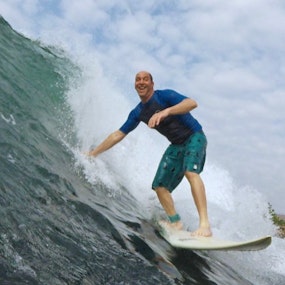
Greg Gordon
Costa Rica Expat / Surfer / Online Business Owner
Greg made his first trip to Costa Rica in 1996, and has since founded CRSurf.com, Costa Rica's original surf report website. He has also written surf travel articles for Surfline, The Inertia, and the Tico Times. When he is not surfing, writing, or helping clients, he is helping out at beach cleanups, playing guitar, and just enjoying and appreciating the natural beauty around him.
CRSURF.com was created in 1999 to help surfers in Costa Rica find the best place to surf, to help travelers plan their trip, and to keep them informed of news and upcoming events. They have published well over 900 surf reports and forecasts, and helped thousands of surfers and their families with their vacations.


























